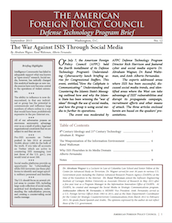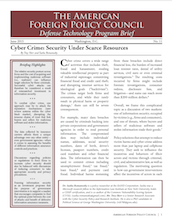Russia Reform Monitor: No. 1994
The Kremlin targets civil society, science;
The plight of Crimea's Tatars
The Kremlin targets civil society, science;
The plight of Crimea's Tatars
Don’t forget what's really at stake for Turkish President Recep Tayyip Erdogan.
On December 17, 2013, the Financial Crimes and Battle Against Criminal Incomes department of the Istanbul Security Directory detained 47 people, including a number of high-level officials. The sons of the minister of the Interior, the minister of Economy, and the minister of Urban Planning were implicated, as was Erdogan's own son, Bilal, with all three ministers handing in resignations.
President Barack Obama says that 99 percent of the world supports his proposed nuclear deal with Iran. He had better check his math.
Since its historic rapprochement with Beijing in the 1970s, America has approached a rising China with an "engagement" strategy guided by two key assumptions: first, that political liberalization would ultimately follow economic growth; and second, that supporting China's integration into the global order would preempt Beijing from forcibly challenging that order. While confidence in those assumptions has waxed and waned, never did a consensus emerge that they were fundamentally flawed - until now.
Explosion kills 27 at southern Turkish border town;
France delivers fighter jets to Egypt;
ISIS uses chemical weapons against Kurdish forces;
Yemen death toll from rebel shelling nearly 100 U.S. warns Kyrgyzstan that strained ties threaten aid
Kazakhstan and China talk border security;
Xi has yet to visit DPRK, meet with Kim Jong Un
PARNAS makes new plans;
Russians willing to trade freedom for prosperity
Turnover atop the PLA;
Beijing issues new draft cyber security law
In Washington, worries over latent nuclear potential;
A shot in the arm for Iran's military budget;
Fear and loathing in Riyadh...;
...and Israel
Buried within the 150-plus pages of technical minutia and regulations that make up the recently concluded nuclear deal between the P5+1 powers and the Islamic Republic of Iran lies a stunning revelation, the full import of which has not yet been adequately appreciated by the international community. It is that the Joint Comprehensive Plan of Action (JCPOA), as the agreement is formally known, is designed to serve as nothing less than a Marshall Plan for the world's leading state sponsor of terrorism.
Russia's AIDS epidemic continues to worsen;
Protectionism hits the national media
SSB blocks militant supply line at Bhutan border;
China to participate in India's fleet review;
India-Iran undersea gas pipeline eyed;
Modi to Silicon Valley in September;
Drone downed by Pakistan not Indian, but Chinese
The White House says the only alternative to the proposed nuclear agreement with Iran is war. However it is the deal itself that is pushing the Middle East towards conflict.
Crimea's status... and Baltic independence;
Still bullish on Syria
Backlash after Russia leases more land to China in Siberia;
Turkey irked by Chinese assaults on religious freedom in Xinjiang
As Vladimir Putin's international image continues to decline, his domestic popularity has, paradoxically, reached an all-time high. The most recent poll by the Moscow-based Levada Center reports a staggering 89 percent approval rating for the Russian president, in spite of a stumbling economy, declining living standards, rampant corruption and deepening international isolation.
China muzzles media amid economic crisis;
Controversial China oil rig returns to South China Sea
India, Pak to join SCO;
U.S. drone strikes kill in IN leaders;
India to supply more power to Bangladesh;
Modi, Sharif meet after a year;
India abstains on UN HRC vote concerning Gaza
Abuses, impunity in Crimea;
The Islamic State comes to Russia
Even before it was formally published late last month, Michael Oren's memoir of his time as Israel's envoy to the United States had ignited a firestorm of controversy, and for very good reason. His book, Ally: My Journey across the American-Israeli Divide, provides the most damning account to date of a "special relationship" that, on President Obama's watch, has deteriorated to an almost unthinkable degree, with the White House coming to view Israel and its often-pugnacious premier, Benjamin Netanyahu, as more of a problem than Iran's nuclear ambitions, Palestinian corruption, or the Syrian civil war.
China to outfit civilian ships “
to serve national defense needs”
New soldiers dispatched to DPRK border to stem defections
Russia warns Sweden, while the Pentagon prepares;
An extension for European sanctions
For decades, first the Soviet Union and then Russia languished under adverse population trends. Deaths far outpaced births, life expectancy was dismally low, and social ills, from alcoholism to unsafe abortion practices, were rampant.
Mobilization in the Arctic;
Nuclear jitters in NATO
PLA still weeding out corruption in Logistics Dept;
China may station j-11s on artificial islands in Spratlys
Bringing Dzerzhinsky back?;
Kremlin, political allies take aim at abortion
India ponders link between Chian and Northeast rebels;
Armed guards may be removed from commercial ships;
Burma's army blocks leader's bid for presidency;
Pak officer assisted Taliban in Kabul attack;
China blocks India bid to sanction Pak terrorist

On July 7, the American Foreign Policy Council (AFPC) held the fourth installment of its Defense Technology Program’s Understanding Cybersecurity lunch briefing series for Congressional Staffers. This event, entitled, “How the Caliphate is Communicating:” Understanding and Countering the Islamic State’s Messaging outlined how and why the Islamic State has been winning the “war of ideas” through the use of social media, and how the group is using social media to further its operations...
If North Korea could develop and test a nuclear weapon, even under a stringent arms control regime, why can't Iran also build a bomb under a far less ample nuclear deal?
Tehran doubles down in Afghanistan;
Iran's hand in Yemen's chaos;
A deepening water crisis;
For Iran, brightening economic horizons;
The tussle of the S-300
Meet the bit players in Russia's media war;
Moscow plays Palestinian peacemaker
Amid multiple signs of an impending battle in Ukraine, NATO and Ukraine have stepped up their response. But so has Russia.
By July 2015 it was clear that Russia is paying a steep economic price for its war in Ukraine. Poverty, inflation, unemployment are all rising, the economy is shrinking, and foreign investment is drying up. Moscow had to cut spending on the 2018 FIFA World CUP, pensions, and infrastructure, not to mention health care, education, science and technology, and infrastructure, i.e. human and social capital.
ISIS imposes fuel blockade;
Bahrain seizes explosives bound for Saudi Arabia;
Libya's Tripoli forces hit ISIS;
Turkey warns U.S. about Kurdish advances in Syria;
Yemeni rebels persist
Al-Shabaab versus the AU;
The U.S. fight against ISIS, year one;
Trepidation in Paris...;
...and mobilization in Tunis;
Militant retribution in Egypt
Off the books, Russia militarizes;
In Transdniester, a dry run?
Pakistan discloses secret Taliban talks;
Vietnam assigns first Ambassador to Bhutan;
Bhutan is Indian Army's next priority;
Taliban attacks Kabul Parliament building Myanmar returns migrants to Bangladesh
Chinese manpads surfacing in Mideast conflicts;
New restrictions, regulations for nonprofits in China

Cyber crime covers a wide range of activities that includes theft, fraud and harassment; stealing valuable intellectual property as part of industrial espionage; committing financial fraud and credit card theft; and disrupting internet services for ideological goals (“hacktivism”). The crimes target both firms and consumers, and while they rarely result in physical harm or property damage, there can still be severe consequences...
Those in America's foreign policymaking circles who are concerned about the emerging U.S.-led nuclear agreement with Iran are increasingly pinning their hopes not on Washington changing its negotiating posture but, instead, on Iranian Supreme Leader Ali Khamenei walking away from the table.
Slowing growth prompts more stimulus;
China fingered in massive hack of US government
Snitching makes a comeback;
The KPRF courts Muslims in Tatarstan
Popular Putin cracks down on "
undesirable"
NGOs;
Russia hits back at Europe with sanctions of its own
On June 18, U.S. Assistant Secretary of State for East Asian and Pacific Affairs Daniel Russel offered a press preview of the U.S.-China Strategic & Economic Dialogue (S&ED) now taking place in Washington, D.C. During the briefing Russel fielded a question about U.S. efforts to reduce tensions with China in the South China Sea. His response was surprising: "As important as [the] South China Sea is... it's not fundamentally an issue between the U.S. and China."
Missile defense for the Gulf;
Ukraine seeks BMD as a hedge against Russia;
In the Army, a focus on integration;
Beijing, Moscow make missile moves
Concerns over China bring Japan, Philippines together;
New China hand leading Asia policy at Obama’
s NSC
It would be fair to say that the past year-and-a-half of nuclear talks with Iran has not been America's finest negotiating hour. But even by the comparatively low standards of U.S. diplomacy to date, the collapse of the American position in recent days has been nothing short of breathtaking.
U.S. ends support to rival Shia groups in Lebanon;
Opposition wants Erdogan out of coalition talks;
Al Qaeda the "
lesser evil"
in Syria?';
Militias oppose ISIS in Libya;
More troops to Iraq to fight ISIS;
In Syria, a sinister synergy;
ISIS makes inroads in southeast Asia...;
...while Islamism flourishes in Central Asia;
Among the OIC nations, the start of a strategy;
The Dutch versus the veil;
How British Jihadis now find their way to the Syrian front
The euphoria to which Turkey’s June 7 election results have given rise calls to mind an oncology ward patient learning that an experimental protocol might slow the advance of her tumor. The elation is warranted in rough proportion to the desperation of the situation. In other words, good news is, like most things, relative.